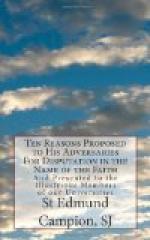THE END.
[Footnote 1: Cf. Newman, Lectures on Anglican Difficulties, Lect. xii.: “I say, then, the writings of the Fathers, so far from prejudicing at least one man (J.H.N.) against the modern Church, have been singly and solely the one intellectual cause of his having renounced the religion in which he was born and submitted himself to her.”]
[Footnote 2: Richard Cheyne, Anglican bishop of Gloucester, to whom there is extant a letter from Campion, dated 1 November, 1571.]
[Footnote 3: The Latin is Philippos.]
[Footnote 4: Seems to refer to the first Protestant bishops, mighty hunters (Genesis x. 9) after place, and, to secure it, all too ready to alienate the manors and possessions of their see.]
[Footnote 5: I have here paraphrased, as any literal translation would have been hopelessly obscure to most modern readers. Campion could but hint darkly his comparison of the Elizabethan persecution to the Decian. The Latin runs: Etenim, ut nostrorum illa fuit Epistasis turbulenta, sic nostrorum haec evasit divina Catastrophe. Epistasis is “the part of the play where the plot thickens” (Liddell and Scott). Catastrophe is “the turn of the plot” (Id.).]
[Footnote 6: Faeces et folles et alumenta gehennae.]
[Footnote 7: Mali corvi.]



